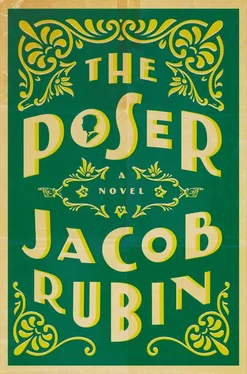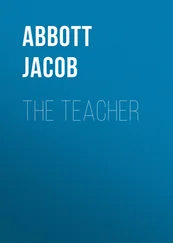It didn’t take long for one Anthony Vandaline, a dogged columnist with the City Press , to grab hold of the story and, after some modest investigation, debunk it:
Like many folks around town, I’ve been impressed by “Giovanni Bernini” and his impersonation act. The kid’s talented, borderline uncanny, no doubt about it. But like a lot of folks I’m sure, I found his “Artist Bio” a little, well, outlandish. So yours truly did a little research, and it turns out the entire thing — all of it — is complete baloney. “Giovanni Bernini’s” real name? Giovanni Bernini. Found in a boat? “Educated” on the freights? Fat chance. The kid was raised in Sea View, five hours north of the City, by his librarian mom, Beatrice Bernini.
This lie, once exposed, paved the way for greater accusations. Soon “anonymous volunteers” came forward, claiming we had rehearsed the impersonations for weeks in advance, making use of complicated microphones to throw their voices. It did not help when word got out in the Monocle and Daily Diary that the act’s first volunteer, a Lucy Starlight, had been sighted repeatedly smooching Bernini at the bars of the Communiqué. Vandaline himself waged a vicious print campaign against us, much, I should say, to Bernard’s and Max’s delight, since the spate of articles only amplified the interest in those Saturday performances by doubling the drama: my imitating the volunteers on the one hand, and the audience’s scanning the stage for invisible strings, microphones, etc., on the other. None of this bothered me: not Max’s fake biography, nor the public’s suspicions. I liked it, in fact. I was no longer a genius but a charlatan, a role I knew how to play.
This siege on my reputation culminated in Vandaline’s unexpected appearance that night at the Communiqué when early in our performance he rose near the foot of the stage, demanding that I imitate him. Max milked the moment for all it was worth (“Have ye no shame, sir?!”), ushering the pompous reporter center stage, where I mimicked him with no difficulty and much pleasure. The crowd applauded, and Vandaline went on to publish his lengthy mea culpa, which, to my great relief, was too glutted with self-aggrandizing caveats (“Did I push it all too far? Okay, but so did Bonaparte”) to leave any room for mention of the thread.
A week later, though, I learned from Max that Bernard had secretly arranged the whole thing, persuading Vandaline to go along with the stunt, knowing full well the spectacle it would create. “Y’know how he is,” Max said. “Mysterious as an end and as a means.”
It was true. When he wasn’t attending to business in his office upstairs, Bernard kept to the back room, playing five-card stud with an unchangeable crew. There were those toughs we met the first day as well as two constant associates: Frankie Diamond and Lou Dust. According to rumor, they were uncle and nephew, strangely close in age. Others said they had nearly killed each other in a bar fight years before and, each stabbed by the other, recovered in adjacent hospital beds, after which they had been inseparable. An odd pair — Frankie tall, with largely veined hands, Lou bell-shaped. They served Bernard in ways both formal and informal, and as they counted their chips or studied a hand, sniped at each other in the style of soldiers or teammates, a banter dense with references to old slights and mutual enemies. Mostly they spoke of Fantasma Falls, out west.
Around these associates, or the bar hands, or sound guys, Bernard kept silent. This was an expression of power, I understood, one that implicitly equated talk with weakness, and when he did talk himself, his tone was either cutting or grandly deferential, as if he were making a show of lowering himself.
With me, he was the latter. Sometimes he would give important visitors a private tour, of which I seemed to be the central attraction. One week it was a bone-white dowager noting each detail with delighted shock: “Oh, and people drink here, how vibrant!” Or an important painter, a guy in a long flannel shirt compulsively rubbing his nose with the back of his hand. “Come meet our star,” Bernard would say another time, introducing me to a tall, eagle-faced man with discerning eyes. A senator, apparently.
“The imitator, got it,” the man said.
“Oh, he’s a load more than that, Charlie,” Bernard said. “Give him five years, and he’ll have your job.” He told me I would one day run the country. “Once you’ve mastered entertainment,” Bernard would say, clapping me on the back, “any field is open to you in this country.”
Always, he was trying to get me to play poker. The one time I did join, Bernard stood so quickly his chair slid against the floor. “Here’s the kid keeping this whole place in business.” He waved me to a seat next to his, and as the game got under way, draped his arm over the back of my chair. Smoke clotted the room. A long-necked pianist in the corner played an angular melody. Bernard whispered in my ear how Lou never bluffed or to watch out for Clem. Hand after hand, that same feeling descended, as it had the first time I imitated him. Teeth exposed in laughter. Arms hugging the puddle of chips at the center of the table. And it took all the energy I had to peel myself out of the chair. Lou and Frankie stood, as if seeing off a dignitary, and in the parting of their suit jackets, metal briefly gleamed and then disappeared. “Come again,” Bernard said. “Anytime.”
That night, on my way home, a skinny man with a misaligned collar asked me how to get to Aberdeen Street. “Oh, it’s very easy,” I assured him and calmly and very clearly sent him in the opposite direction. I waved off his thanks with a big, fake smile. Then I hopped up the steps of the corner store and bought some cigarettes. I smoked one but coughed so much I threw the pack out and woke up that next morning with a torrential headache. After that, I did my best to avoid that back room.
But Bernard knew what he was doing. The Vandaline affair increased my fame. Like some urban eczema, those faces appeared more and more on the skin of the City: on the side of a delivery van, in chalk on the sidewalk, in spray paint on a fifty-foot rail bridge. People recognized me on the street, asked for my autograph, buttonholed me by the entrance to the train: How do you do it? How can I learn? Teach me . For a time the scandals hardened these public interrogations: “I knew it! Is it true?” “They say you a fraud, man,” a baggy-eyed man told me under the awning of the Hotel San Pierre. “Of course I am,” I answered.
That’s how I talked now. As I understood it, the public ached to know me and yet refused to believe they did. To understand me would disappoint them as much as not knowing me at all, a paradox that expressed itself most often through touch. Passengers on the subway, waiters at the diner were always patting my back, for instance. Yet, after this presumptuous leap, each would back off, nearly recoil, as if to reestablish the moat that ought, by all rights, to separate a talent from his devotees. What they desired, in other words, was to be confounded, but confounded warmly , a want I was happy to meet.
But all of that broke down in Lucy’s apartment.
Given the cold, we spent most days tucked into her L-shaped studio apartment, in a new proximity I found both thrilling and frightful. With Max and Mama, the more I hung around them, the more their gestures seeped into my very person, but with each hour Lucy only wrapped herself in a denser mystery, a thousand details still burying her thread: the way she puckered her lips to blow a hair fallen over her face, the angle at which she rested her head when twirling spaghetti with a fork.
It had to do with her body, soft and round and the first I’d ever known. I don’t just mean the first I’d ever laid against, shared a bed with, or made love to (a phrase Lucy despised—“We don’t make love, Giovanni, we fuck !”), no, she was the first person, in my life, to exist apart, as a whole. Perhaps I did not always allow for the fullness of people. In the case of Max, for instance, perhaps I was too busy charting the movements of his hands, too busy concocting my “Max” rebus to encounter the reality of his presence. And perhaps (I thought, watching Lucy constructing a lipstick-applying moue in the mirror) the same held for my current volunteers, each of whom I reduced in the moment I met them to a gestural acronym. Perhaps (I thought, watching Lucy, post-shower, brush her hair with strong untangling strokes) all my previous work had been a deception, as I’d felt instinctively our first night at the Communiqué.
Читать дальше












